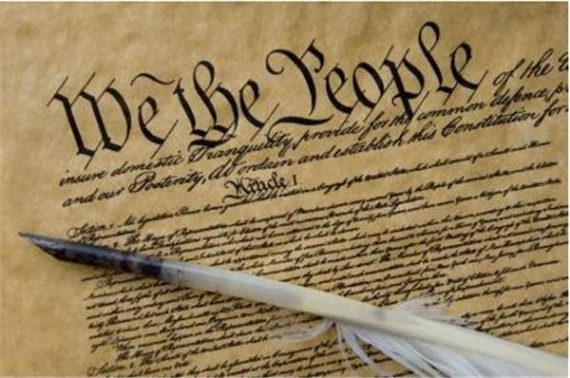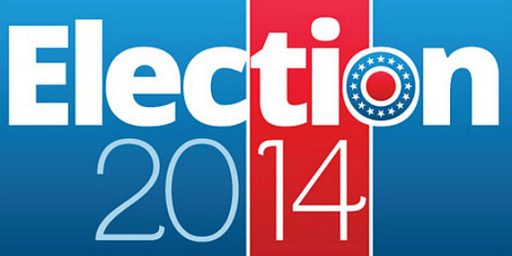Alaska Governor Says He Won’t Comply With Federal Health Care Law
Alaska Governor Sean Parnell says he won't comply with any of the provisions of the Affordable Care Act, but his decision seems to rest of precarious legal ground.
Alaska Governor Sean Parnell says he will not act to implement any of the provisions of the Affordable Care Act:
JUNEAU, Alaska —Alaska Gov. Sean Parnell said he won’t implement the federal health-care overhaul after a judge in Florida struck down the law as unconstitutional.
It’s not immediately clear what practical impact the unusual move would have on Alaskans, an estimated 14% of which are uninsured year-round. A major expansion of the federal law is still pending, and a legal expert and health-care consumer advocate say any refusal by the states to participate in the law is an invitation to the federal government to step in and implement it for them.
Mr. Parnell, who sought the advice of his attorney general amid concerns implementing the law would violate his oath of office, told the Juneau Chamber of Commerce the state would pursue lawful, market-based solutions to making insurance affordable and accessible to Alaskans.
He said the Florida judge’s ruling is the law of the land, as it pertains to Alaska, barring implementation of the federal law here. He said the state will pursue options of its own instead.
Alaska was one of 26 states that were party to the Florida lawsuit; however, in other cases, two federal judges have upheld the law and one judge ruled a provision requiring citizens to buy health insurance or face penalties—a major point of contention in the Florida case—is unconstitutional but did not strike down the rest of the law.
The fact that Parnell is basing his position on Judge Vinson’s decision is interesting for a few reasons. For one, it’s inevitable that when this case is formally appealed to the 11th Circuit Court of Appeals that a stay will be issued to bar the legal effect of the District Court ruling. Will Parnell reverse himself at that point and agree to implement the law? Or, what if the 11th Circuit reverses Judge Vinson’s ruling. what will Parnell do then?
A second point worth keeping in mind is that Judge Vinson’s ruling did not include any injunction barring implementation of the act. Some have argued, and Vinson alluded to this in his opinion, that the fact that the entire law was declared unconstitutional means that no injunction is necessary. That is by no means clear as a matter of law, however, and it’s the reason that the Federal Government has asked Judge Vinson to clarify his ruling:
The Obama administration is asking a federal judge who struck down the healthcare reform law to clarify that states must still implement the overhaul as the appeals process plays out.
Some states are saying the Jan. 31 ruling relieves them from implementing the sweeping reform law because the federal judge in Florida found it to be unconstitutional.
The Obama administration, in a Thursday evening filing in a Northern Florida federal court, is asking the court to clarify that the 26 states who successfully challenged the law are still required to comply with it.
U.S. District Judge Roger Vinson ruled that the law’s requirement for individuals to purchase insurance is unconstitutional, and therefore, the rest of the law is unconstitutional because the provision is too central to making the law function. The administration points out that the so-called individual mandate does not go into effect until 2014, while other parts of the law have already gone into effect.
“[A] contrary understanding would threaten serious harm to many Americans currently benefiting from provisions of the Affordable Care Act that are already in effect and would significantly interfere with defendants’ statutory duty to implement the Act as Congress directed,” the Justice Department wrote in its court filing.
Judge Vinson has already issued a ruling giving the states involved in the lawsuit until Thursday to respond to the Federal Government’s motion. Essentially what the Feds are asking Vinson to do here is to define the scope of the legal effect he intended his ruling to have, which is important in determining what kind of stay would have to be applied for at the appellate level. The point that makes this relevant to Parnell’s position is that, at the moment, it is by no means clear that the January ruling provides any legal basis upon which he or any other governor can essentially ignore Federal Law. Hopefully, Judge Vinson will make that clear in his next ruling.
Finally, there’s something slightly disconcerting about a Governor essentially saying he’s going to ignore Federal law. It’s essentially a form of nullification and. as I’ve argued before, there is no legal or historical basis for the idea that the states have the authority to nullify Federal law. Parnell is walking a dangerous road here and he should be careful where he treads.







When all you have is a hammer, everything looks like a nail.
“Finally, there’s something slightly disconcerting about a Governor essentially saying he’s going to ignore Federal law.”
Except that the law has been declared unconstitutional.
By one Federal District Court Judge who didn’t issue an injunction against its implementation pending appeal
Damn those Alaska Governors! Always following the law.
Judge Vinson’s ruling is the law as it stands now. Individual mandates have been declared unconstitutional, therefore making any injunction barring implementation unnecessary because most federal judges believe the states would not begin to implement anything ruled to be unconstitutional.
The question now is what happens to states that have ignored the ruling and are proceeding with implementation? When the Supreme Court upholds the ruling, will the governors of those states reimburse the public out of their personal funds for anything spent while violating the ruling?
The ability of some people to ignore facts and reality is absolutely mind-boggling.
Vinson’s words …
“… there is a long-standing presumption .that officials of the Executive Branch will adhere to the law as declared by the court. As a result, the declaratory judgment is the functional equivalent of an injunction”
Vinson’s allusion that no injunction is necessary is 100% correct, or at least it should be in a sane world. If an injunction was issued, it should be applicable to those states that are implementing the law, not those 26 that were inclined not to.
In either case, the end result is obviously the same, which is to wait to see what SCOTUS says. Judges have been divided on the constitutionality of the individual mandate, some of the brightest legal minds in the country have also been divided, and the legal and fiscal ramifications of an eventual implementation of this law are very, very significant. So long as there is some substantial question as to what ultimately may be decided, proceeding with implementation anywhere seems foolish.
Perhaps this is another opportunity to ask (for which I have not received an answer to yet):
If the Individual Mandate in the Healthcare Act is unconstitutional, how does that reconcile with the stated conservative goal to eliminate Social Security and require individuals to contribute a portion of their income towards private retirement accounts?
c.red, The opt out of SS was always an option. It was designed allow you to privatize a portion of individual retirement, not the whole thing and not by mandate.
Steve,
I believe c.red is referring to the Social Security reform plans that some conservatives have put forward that would require, as a matter of Federal Law, that every American have a retirement account and make contributions to it.
How is that constitutional if the mandate is not?
Aaron here, guest blogger at Patterico’s.
Actually the governor is on 100% solid legal ground. the judge made his ruling. alaska is a party to the case. they won and they are allowed to act like they won. they might lose later, but for now, they won.
as for the stay, actually it is far from inevitable that the stay will be put in place. boiling down to it all, stays are designed to prevent societal disruption. obamacare IS a societal disruption. i mean that is not the exact way the legal standard is put, but that is what it boils down to.
And yes, vinson’s ruling was clear. the obama administration is “playing dumb” with the decision, but it was 100% clear.
For God’s sake don’t say anything mean about the governor. The last time that happened their governor bailed, ran off to the Lower 48 and became a reality TV star. They’re very fragile up there. I imagine it’s the darkness and the cold.
Mr. Reynolds, What a well reasoned comment.
Yes, Doug has gotten my point, though I would probably categorize it as more than a few. It is my understanding that is the basis of almost all conservative plans that “fix” social security, including the Bush plan from 2006 and the current Ryan budget road map.
I’m not really trying to play gotcha here, it is just something I think is a massive inconsistency in conservative thought right now.
As for Alaska, from a non-lawyer; how does it normally work when different courts come to conflicting rulings? I know it ultimately gets subject to appeal to a higher court up to the SC, but right now is a party subject to the decision of the district they are in, the last court ruling (which I believe was not Vinson’s, but said something along the lines of the state doesn’t have standing in this matter) or do they get choose whichever ruling they like?
c.red. As Alaska was part of the lawsuit filed in Florida, the decision of that court would be the one that applies. Judge Vinson wrote in his opinion he expected the federal government to follow the findings of the federal court. Who would have thought otherwise? Maybe that judge in Louisiana believed the federal government would follow his instructions. I could be time for congress to invite government officials into committee hearings to find out why they ignore federal law.
If that is the case, Alaska is subject to Vinson’s ruling, (and I have no reason to doubt it) then it sounds like the Governor of Alaska is doing exactly as he should do pending appeal or clarification from the judge.
I do think it would be imprudent for him to not start planning on what needs to be done if the decision gets reversed on appeal, but I don’t see anything from his statement saying he isn’t, just that he isn’t doing any to implement the Healthcare Act.
It was Alaska and the other states which sued which won. They are entitled to behave like they won. It is the Obama administration which lost and they are not following the law. Can you spell high crimes and misdemeanors?
“How is that constitutional if the mandate is not?”
IOKIYAR, of course…
“Can you spell high crimes and misdemeanors?”
I guess some folks are going to have to scrounge around for something to use to try to impeach the president…hell, it worked with Clinton…
Hmm… I guess c.red has nothing to say about the issue, so he trots out the “some conservatives are proposing this, so every other conservative must agree with it if they don’t denounce it immediately” card.
Nah, not gonna play.
The gov’s on solid legal ground. On the other hand, the Obama administration has quite a history of trying to ignore inconvenient court rulings — the EPA power grab over carbon emissions, the FCC on net neutrality, oil exploration permits, now this. ‘Nuff said.
J.
Finally, there’s something slightly disconcerting about a Governor essentially saying he’s going to ignore Federal law.
Disconcerting? Not in the slightest. I wish a few of them would start refusing to enforce the Controlled Substances Act, as well.
If the Individual Mandate in the Healthcare Act is unconstitutional, how does that reconcile with the stated conservative goal to eliminate Social Security and require individuals to contribute a portion of their income towards private retirement accounts?
Because 1) those plans never went far enough for attention to be drawn to that angle of the issue, and 2) people were excited to finally have an option where previously there was none.
Also,
I’m not really trying to play gotcha here
B.S.